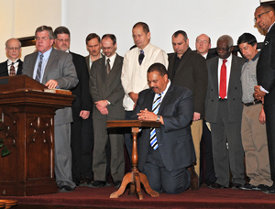Should a church require membership for a secretary or administrative assistant?
Poll Results
Should a church require membership for a secretary or administrative assistant?
Yes, definitely Votes: 9
No, definitely Votes: 1
Other Votes: 2
Yes, unless they are missionaries, etc., serving temporarily Votes: 3
Yes, ideally, not exceptions can be made Votes: 1
No, but membership is preferred Votes: 1
I used to have one opinion and now another (and I will explain) Votes: 0
 Reprinted with permission from
Reprinted with permission from
Discussion